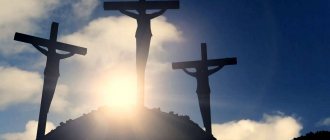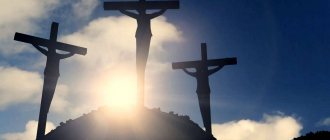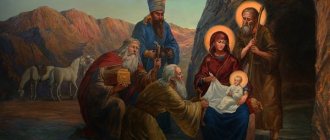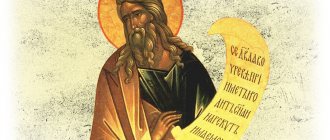Question:
Forgive my ignorance, but I have this question. In the promise, the Lord said that the Savior would appear into the world from the line of David. The Gospel gives a detailed genealogy of Joseph, the husband of the Blessed Virgin, who was indeed a descendant of David. But Joseph was only the stepfather of Christ. I heard a version that the Most Pure One herself also came from the tribe of Judah, because According to the law, all marriages had to be performed within their clan. But... Righteous Elizabeth, the mother of John the Baptist, called in the Bible a relative of Mary, is also mentioned as the daughter of Aaron. So Jesus did not come from the tribe of Judah? Resolve my doubts. God bless you!
Curse of Jehoiachin?
According to the prophet Jeremiah, Jehoiachin (descendant of King David), was cursed and compromised the seed of David through Jehoiachin, making his descendants unable to serve as King: “Thus says the Lord: Write down this man childless, a man wretched in his days, for no one is none of his descendants will sit on the throne of David and rule over Judah” (Jer. 22:30).
Because Joseph was from this line, no physical son of Joseph could inherit the throne of David. Miriam's line was unblemished, so her son could legitimately claim the throne of David.
However, as a stepfather, Joseph was Yeshua's legal guardian. Joseph thus provides a legal connection to the line of David for Yeshua. Therefore, Joseph's genealogy is relevant to Matthew's record. This shows that Yeshua did not have a father or guardian outside the line of David that would give Him a genealogy outside the line of David.
On the other hand, even if only His mother were a descendant of David, this would be enough for Yeshua to come from the line of David. Some traditional rabbis may protest this by saying that the mother's side cannot give genealogical credentials, and it is true that the biblical record is patrilineal. However, there are clear exceptions in Scripture regarding a woman's right to pass on through family inheritance (Numbers 27:1-7).
So, whether His ancestry is viewed on the legal stepfather side or the biological mother side, Yeshua is the “son of David” and the commissioned Messiah of Israel. In fact, since the Messiah was prophesied to be “born of a virgin” (Isaiah 7:13-14), this was what His origin must have been. The fact that the true Messiah had to be not only the son of David, but also born of a virgin, narrows the genealogical line. Besides Yeshua, what other legitimate claimants claim this position?
Hieromonk Job (Gumerov) answers:
According to church tradition, which is reported by Saint Demetrius of Rostov, the father of the Most Pure Virgin Mary of St. right Joachim traced his descent from David, but not through Solomon, but through his brother Nathan, who was also born from Bathsheba (2 Sam. 5:14; 1 Chron. 3:5; 14:4). Nathan is mentioned as the ancestor of Jesus Christ by St. Evangelist Luke: Mattafaev, Nathanov, Davidov
(Luke 3:31). And since St. The evangelist Matthew names not Nathan, but Solomon, then researchers believe that in the Gospel of Luke the genealogy of the Savior is given according to the Mother. Joseph is indicated at the end of the genealogy, since the family is traced through the male line, and the mother could not be indicated as a link in the chain of inheritance.
Blessed Virgin Mary and St. right Elizabeth were cousins on her mother's side. Mother of the Blessed Virgin Mary St. right Anna came from the tribe of Levi, the clan of Aaron. She was the daughter of the priest Matthan. His wife was Mary from the family of Judah. They had three daughters: Maria, Sovia and Anna. “Of these, Mary was the first to marry in Bethlehem and gave birth to Salome; then Sovia married, also in Bethlehem, and gave birth to Elizabeth, the mother of John the Baptist; the third, as we have already said, the mother of the Most Holy Theotokos, was given in marriage to Joachim to the country of Galilee, to the city of Nazareth" (St. Demetrius of Rostov. Life of the Saints and Righteous Godfather Joachim and Anna, September 9
).
The law did not prohibit marriages between representatives of different tribes. So King Saul, who came from the tribe of Benjamin, gave his daughter Michal to David (1 Samuel 18:27), who belonged to the tribe of the patriarch Judah. The restriction existed for the bride, who, in the absence of brothers, was the heiress. It was not allowed for the land to pass from one tribe to another: this is what the Lord commands about the daughters of Zalpaad: they can be the wives of those who please their eyes, but they must be wives in the tribe of their father’s tribe, so that the inheritance of the children of Israel does not pass from tribe to tribe. knee; for every one of the children of Israel must be bound to the inheritance of the tribe of his fathers
(Numbers 36:6-7).
September 20, 2007
Genealogy of Jesus Christ
30th Sunday after Pentecost
Genealogy of Jesus Christ, Son of David, Son of Abraham. Abraham gave birth to Isaac; Isaac gave birth to Jacob; Jacob begat Judah and his brothers; Judah fathered Perez and Zerah by Tamar; Perez begat Hezrom; Hezrom begat Aram; Aram gave birth to Abminadab; Amminadab begat Nahshon; Nahshon begat Salmon; Salmon fathered Boaz by Rahab; Boaz fathered Obed by Ruth; Obed begat Jesse; Jesse begat David king; David the king begot Solomon from Uriah; Solomon begat Rehoboam; Rehoboam gave birth to Abijah; Abijah begat Asa; Asa begat Jehoshaphat; Jehoshaphat begat Joram; Jehoram begat Uzziah; Uzziah begat Jotham; Jotham begat Ahaz; Ahaz begat Hezekiah; Hezekiah begat Manasseh; Manasseh begat Amon; Amon gave birth to Josiah; Josiah begat Joachim; Joachim gave birth to Jehoiachin and his brothers, before moving to
Babylon. After moving to Babylon, Jeconiah gave birth to Salathiel; Shealtiel begat Zerubbabel; Zerubbabel begat Abihu; Abihu begat Eliakim; Eliakim begat Azor; Azor begat Zadok; Zadok gave birth to Achim; Achim begat Eliud; Elihu begat Eleazar; Eleazar begat Matthan; Matthan gave birth to Jacob; Jacob begat Joseph, the husband of Mary, from whom was born Jesus, who is called Christ. So all the generations from Abraham to David are fourteen generations; and from David to the deportation to Babylon, fourteen generations; and from the migration to Babylon to Christ there are fourteen generations. The Nativity of Jesus Christ was like this: after the betrothal of His Mother Mary to Joseph, before they were united, it turned out that She was pregnant with the Holy Spirit. Joseph, Her husband, being righteous and not wanting to make Her public, wanted to secretly let Her go. But when he thought this, behold, an angel of the Lord appeared to him in a dream and said: Joseph, son of David! Do not be afraid to accept Mary your wife, for what is born in Her is from the Holy Spirit; She will give birth to a Son, and you will call His name Jesus, for He will save His people from their sins. And all this happened, that what was spoken by the Lord through the prophet might be fulfilled, saying: Behold, a virgin is with child and will give birth to a Son, and they will call His name Immanuel, which means: God is with us. Rising from sleep, Joseph did as the Angel of the Lord commanded him, and received his wife, and did not know Her, when at last She gave birth to Her firstborn Son, and he called His name Jesus.
Mf. 1:1-25
In today's Gospel we read the genealogy of Jesus.
The Gospel of Matthew, which opens the New Testament, begins with the words: “The genealogy of Jesus Christ, the Son of David, the Son of Abraham” (Matthew 1:1). The term “geneasology” in the Russian translation conveys a Greek expression that literally means “book of origin”, “book of genealogy” or “book of being” (in the Slavic translation “book of kinship”). In relation to Jesus, this term indicates the same type of "genealogy" that Adam had: just as Adam had no earthly father, but God was his Creator and Father, so Jesus had no earthly father.
The "Book of Kinship" of Jesus Christ contains a long list of names - His ancestors according to the flesh. The list is presented in a form unusual for the modern reader: “Abraham begat Isaac; Isaac gave birth to Jacob; Jacob begat Judas and his brothers” (Matthew 1:2). This list ends with the following words: “Jacob begat Joseph, the husband of Mary, from whom was born Jesus, who is called Christ. So all the generations from Abraham to David are fourteen generations; and from David to the deportation to Babylon, fourteen generations; and from the deportation to Babylon until Christ there are fourteen generations” (Matthew 1:16–17).
This text poses many questions to the reader. Why is Jesus called the Son of David, the Son of Abraham in the very first verse of the Gospel? Why does the life of Jesus begin with His genealogy? First of all, we note that Matthew calls Jesus “Christ,” that is, the Anointed of God, from the very first line presenting Him as the Messiah promised by the prophets. Matthew places the emphasis not on His divine origin, but on His human origin, calling Jesus Christ the son of David and the son of Abraham. At the same time, like Mark, he emphasizes His messianic role by using the term “Christ” along with the personal name Jesus.
The term “son” is used in the sense in which it was used in the Jewish tradition. In the language of the Old Testament, “son” was any male descendant, including grandchildren, great-grandchildren, great-great-grandchildren, and so on. It should be noted that genealogies - lists of the names of a person's ancestors - are of utmost importance in the Bible. The pedigree was by no means perceived simply as a list of names that helps to establish the origin of a particular person. Pedigree primarily indicated the heritage that each person carries; she wove his name into an unbroken chain of names going back to the father of the Jewish people Abraham and through him to the father of all nations Adam. By citing the names of Jesus' ancestors, the Evangelist wanted to emphasize the fact that He was a real Man, Whose name is woven into the continuous thread of human names.
You can find out more in the book of Metropolitan Hilarion of Volokolamsk “Jesus Christ. Life and Teaching”, posted freely on our portal, as well as in the books of the “Read the Gospel” series. Also, the Gospel of the day with Metropolitan Hilarion is available in a specially created Telegram channel.
Content
- 1 Origin and meaning of the name 1.1 The name “Jesus”
- 1.2 Christ (Messiah)
- 1.3 Other names and epithets of Jesus in Christianity
- 2.1 Canonical books of the New Testament
- 3.1 Messianic prophecies of the Old Testament in Christianity 3.1.1 The time of the coming of the Messiah
- 4.1 Historicity of Jesus Christ
- 5.1 Pedigree
- 5.6.1 Entry of the Lord into Jerusalem and sermon in the Temple
- 5.7.1 Christ's appearance to the disciples after the resurrection
- 6.1 Main features
- 7.1 Judaism
- 8.1 In the Bible
- 9.1 In literature
- 12.1 Primary sources
Hope for the future
One day Israel as a people will enjoy this security when we as a nation return to the son of David, the Lord Messiah Yeshua, as prophesied in Hosea 3:5: “After this the children of Israel shall return and seek the Lord their God and David their king and they will revere the Lord and His goodness in the last days.”
Today, each of us personally can return to our true Lord and King, Yeshua, and be saved, live in security and accept His goodness. Let us “honor the Son” by submitting to His authority through obedience to His Word. By acknowledging our sins and relying on His atonement, trusting in His sacrifice, we can rest knowing that He is our Lord and our Righteousness.
Author - Sam Nadler / wordofmessiah.org Translation - Irina Petra for
Donate Last: 07/05. Thank you!
Subscribe: Telegram • Facebook • • • Twitter • Instagram • Youtube
Son of David, Lord of David
Paradoxically, the Messiah, the son of David, was also supposed to be the Son of God—in fact, the Messiah was supposed to be the Mighty God (Isa. 9:5,6—Hebrew, El-Gibbor). The son of David is destined not only to reign from the throne of David over all Israel, but also to have supreme authority over all the nations of the world (Isaiah 2:1-4; 11:10; 49:6). Again, Yeshua is the only contender with proper credentials.
In Psalm 2:12, David wrote, “Honor the Son, lest He be angry, and lest ye perish in [your] way, for His wrath will burn quickly. Blessed are all who trust in Him.”
To “honor the Son” means to pay due respect to the Son, the symbolism of which can be seen in the kissing of the King’s ring. Therefore, Yeshua is the only one who has true power over every life. Yeshua is the only true Son of God to whom we must give due respect. Yeshua is the only Son of David who can bring true security to our people today and forever, as prophesied in Jeremiah 23:5-6:
“Behold, the days are coming, says the Lord, that I will raise up a righteous Branch for David, and a King will reign, and will act wisely, and will execute judgment and righteousness in the earth. In His days Judah will be saved and Israel will live in safety; and this is His name by which they will call Him: “The Lord is our justification!”
Resurrection
On the third day after his death, the martyr rose from the dead and appeared in the flesh to his disciples. He gave them the last instructions before his ascension to heaven. When the guards came to check if the deceased was still there, they found only an open cave and a bloody shroud.
Resurrection of Jesus Christ
It was announced to all believers that the body of Jesus was stolen by his disciples. The pagans hastily covered Golgotha and the Holy Sepulcher with earth.









